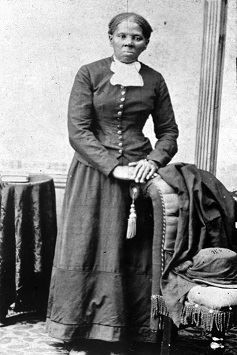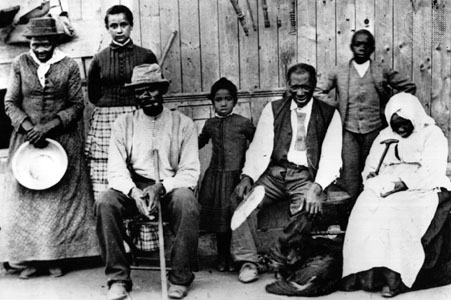 |
| ( (ww.makers.com)) |
Tanner Tollestrup Mrs.Hanson HSE: English 2 Period 4 3 February 2017 A Humble Servant, A Kind Helper, A Loving Caretaker Nineteen death defying trips, three hundred men, women and children freed from the chains of slavery all because of the efforts of a single person ("Harriet Tubman"Contemporary). Harriet Tubman, an ex-slave, was a hero in countless different ways. She was "the abolitionist, nurse, and feminist Harriet Ross-later Harriet Ross Tubman-was one of eleven children born to the slaves Benjamin Ross and Harriet Green...She worked as an agent on the railroad, assuming different disguises to assist runaways in obtaining food, shelter, clothing, cash, and transportation" ("Harriet Tubman"Encyclopedia). "She was...the most famous 'conductor' on the Underground Railroad, an elaborate secret network of safe houses organized for that purpose" ("Harriet Tubman" Biography ). Tubman, being a "conductor" for the underground railroad, a path connected with secret routes and safe houses to help slaves escape to freedom, was able to use all of her heroic traits to help others have a better future. Throughout her life, she helped so many different people in so many different kinds of ways. Harriet Tubman was a hero because she had the courage and kindness to help those who were en-captured by the chains of slavery.
Born in Maryland, Tubman grew up as a slave where she faced many hardships that affected her life. At fifteen years of age, Tubman got caught in the middle of a bad situation where a slave was attempting to escape. The slave owner threw a two-pound lead weight that hit Tubman in the head, causing many difficulties in her life. She grew up her whole life having seizures, randomly falling asleep, and many other things that affected her in different ways ("Harriet Tubman"Contemporary). Even though she had a tough life, she never backed down. She, "rather than remaining in the safety of the North, Tubman made it her mission to rescue her family and others living in slavery"("Harriet Tubman" Biography). Even towards the boundary of her life, "Tubman continued her work in the black community by taking in orphans and the elderly, often receiving assistance from wealthier neighbors. She helped establish schools for former slaves and wanted to establish a permanent home for poor and sick blacks. Tubman secured twenty-five acres in Auburn through a bank loan but lacked the necessary funds to build on the land" ("Harriet Tubman"Encyclopedia). For the duration of her life, she was always helping others. Even when she wasn't physically able to do the things she did in her prime, she still found a way to succor others. Tubman did everything in her power to support everyone she came in contact with. She did all things from helping children, and the elderly, to providing nourishment to the diseased.
Harriet Tubman had immeasurable amounts of courage that never ran out on any of her journeys. Tubman's bravery can be demonstrated in countless different ways. For example, "Rather than remaining in the safety of the North, Tubman made it her mission to rescue her family and others living in slavery"("Harriet Tubman" Biography ). She didn't care how dangerous the path was, because she was willing to give up her needs when helping others. She put herself behind her, and looked for ways to rescue her family and friends. At the time, the North was the safest because there was no slavery laws, but the south's brutal slavery laws didn't stop Tubman from saving those who were in her same situation. Tubman's nerve is displayed when "she made the dangerous trip back to the South again to rescue her brother and two other men. On her third return, she went after her husband, only to find he had taken another wife. Undeterred, she found other slaves seeking freedom and escorted them to the North" ("Harriet Tubman"PBS ). Without acknowledging the amount of danger involved in her trips, she held strong and kept her courage with her and never let it go. She kept moving even when she found her husband with another woman. "Undeterred," she kept moving, and rescued many from her home town. The word "undeterred" tells a story of her life, a story of bravery, and the pursuit of happiness. "She led the weary and frightened fugitives in singing spirituals; and threatened to kill escapees who tried to go back by pulling out her revolver and shouting at them, "move or die!" ("Harriet Tubman" Contemporary). Doing these things takes more courage than people can comprehend. Threatening to kill someone if they wouldn't come informs that she was willing to do whatever it took to make sure they would escape safely, even if it meant striking fear in someone's heart. She would sing to take away their fear and anguish and to carry their soul into song.
 |
| ( (www.math.buffalo.edu)) |
Harriet Tubman's willingness to help was what caused her to rescue hundreds of people from the treacherous chains of slavery. The events that represent this are so numerous that they can't be counted. Just one these events is "within a year of her escape, she began the task of freeing her relatives. Tubman's first stop was Baltimore, Maryland, for her sister and two children" ("Harriet Tubman" Notable ). This presents how almost immediately after she had escaped slavery, she came right back to help the others in her family. She traveled for to help her family, all the way to Baltimore, Maryland. Tubman didn't think about what she was going to do, she just went right away and freed her family. Above all, Tubman wanted to rescue her whole family no matter the danger. "Harriet's abduction of her parents was an event in Underground annals. It was significant, not only because rarely did aged folks take to the Road, but because Harriet carried them off [in a 'patched together wagon']" ("Harriet Tubman" Contemporary). She helped others even if it meant more pain or more struggle to herself. Elderly people were rarely rescued or escaped the system of slavery. Because of her parents being in their old age and not a good physical state, Tubman had to work extra hard to see them to safety. Knowing that the wagon was "patched together," means that the trip was even trickier to complete. After her days in the Underground Railroad, she kept serving others. "When the Civil War broke out, Tubman served in the Union army as a scout, spy, and nurse. In 1862 she went to Beaufort, South Carolina, where she nursed both white soldiers and black refugees from neighboring plantations ("Harriet Tubman" Encyclopedia). Tubman helped and risked her life to rescue other slaves for her whole life, but she still wanted to help others in different positions during the Civil War. Some were more dangerous, such as; being a scout, and a spy, but other other occupations that were not as dangerous like nursing.
Harriet Tubman earned the label, "hero," which is an honor to behold. She is a hero because she had the courage to help others and let go of herself. Throughout her life she was able to do extraordinary things that will be remembered forever. Because of her courage and willingness to help others, she was able to be an outstanding "conductor" in the Underground Railroad. She also had many other jobs or occupations that required these heroic traits such as a scout, spy and nurse for the Union army during the Civil War. She is an inspiration to all in various ways. For example, Tubman says, "'I never ran my train off the track, and I never lost a passenger.' Indeed, none of the fugitives she guided was ever captured" ("Harriet Tubman" Contemporary). In all her trips as a part of the Underground Railroad, she had never lost a passenger, not one. This is inspirational because it shows how she was so unbelievably unselfish, and how she always put others needs before her own. This hero is an inspiration to me because I aspire to be more unselfish, and put other's needs before mine own. Nineteen trips back and forth, three hundred men, women, and children freed from the chains of slavery. All because of one woman ("Harriet Tubman"Contemporary).
Works Cited
"Harriet Tubman." Contemporary Black Biography, vol. 9, Gale, 1995. Biography in Context,
link.galegroup.com/apps/doc/K1606000476/BIC1?u=powa9245&xid=f3c19acd. Accessed 12 Jan. 2017.
"Harriet Tubman." Notable Black American Women, Gale, 1992. Biography in Context,
link.galegroup.com/apps/doc/K1623000450/BIC1?u=powa9245&xid=33c016fa. Accessed 12 Jan. 2017.
Maxwell, Louise. "Harriet Tubman." Encyclopedia of African-American Culture and History,
Gale, 2006. Biography in Context, link.galegroup.com/apps/doc/K3444701240/BIC1?u=powa9245&xid=8bb78f24. Accessed 12 Jan. 2017.
"Harriet Tubman." Biography.com. A&E Networks Television, 05 Jan. 2017. Web. 23 Jan. 2017
Africans of America. "Harriet Tubman." PBS. PBS, n.d. Web. 23 Jan. 2017.
Page created on 2/9/2017 12:00:00 AM
Last edited 2/9/2017 12:00:00 AM
